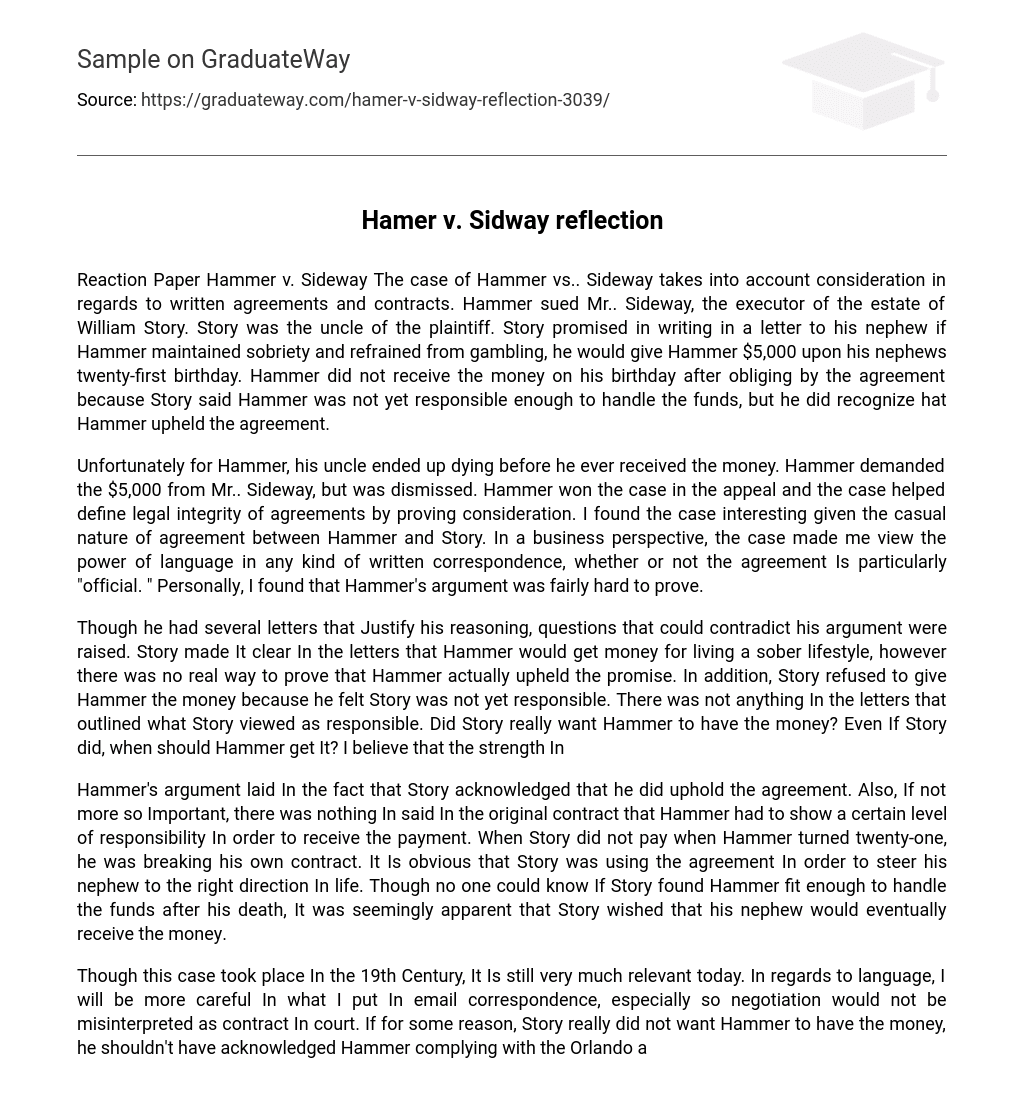Story was the uncle of the plaintiff. Story promised in writing in a letter to his nephew if Hammer maintained sobriety and refrained from gambling, he would give Hammer $5,000 upon his nephews twenty-first birthday. Hammer did not receive the money on his birthday after obliging by the agreement because Story said Hammer was not yet responsible enough to handle the funds, but he did recognize hat Hammer upheld the agreement.
Unfortunately for Hammer, his uncle ended up dying before he ever received the money. Hammer demanded the $5,000 from Mr.. Sideway, but was dismissed. Hammer won the case in the appeal and the case helped define legal integrity of agreements by proving consideration. I found the case interesting given the casual nature of agreement between Hammer and Story. In a business perspective, the case made me view the power of language in any kind of written correspondence, whether or not the agreement Is particularly “official. ” Personally, I found that Hammer’s argument was fairly hard to prove.
Though he had several letters that Justify his reasoning, questions that could contradict his argument were raised. Story made It clear In the letters that Hammer would get money for living a sober lifestyle, however there was no real way to prove that Hammer actually upheld the promise. In addition, Story refused to give Hammer the money because he felt Story was not yet responsible. There was not anything In the letters that outlined what Story viewed as responsible. Did Story really want Hammer to have the money? Even If Story did, when should Hammer get It? I believe that the strength In
Hammer’s argument laid In the fact that Story acknowledged that he did uphold the agreement. Also, If not more so Important, there was nothing In said In the original contract that Hammer had to show a certain level of responsibility In order to receive the payment. When Story did not pay when Hammer turned twenty-one, he was breaking his own contract. It Is obvious that Story was using the agreement In order to steer his nephew to the right direction In life. Though no one could know If Story found Hammer fit enough to handle the funds after his death, It was seemingly apparent that Story wished that his nephew would eventually receive the money.
Though this case took place In the 19th Century, It Is still very much relevant today. In regards to language, I will be more careful In what I put In email correspondence, especially so negotiation would not be misinterpreted as contract In court. If for some reason, Story really did not want Hammer to have the money, he shouldn’t have acknowledged Hammer complying with the Orlando agreement. Likewise In business negotiations, It Is Important to make your own Orlando Intent Is protected by your Ritter language. He letters form his uncle into evidence to support his argument. I doubt that Story expected his letters to be reviewed in a court of law regarding this matter. Basically, you never know when something you write can be used for or against you in court. Establishing clear directives and conditions in contracts will work in favor of all participating parties by eliminating ambiguity. Hammer may have got what he wanted at the end, but it came with a price. He had to go through two trials, and it is assumed that he paid for costs associated with court such as lawyer fees.
Going into the agreement, Hammer had to adjust his way of life in order to comply with the contract and he upheld his end of the bargain. What was more unfortunate for Hammer is that he had to go to trial at all. If I were Hammer, I would be extremely annoyed. Dealing with money is usually a sensitive matter. The $5,000 dollars that Hammer was fighting for is a significant amount today and was even more significant in that time period. This case reminds me about the struggles my father had when trying to become the executor of my late aunt’s estate.
An unnecessary family feud manifested because the deceased did not leave clear instructions and there was a certain degree of ambiguity in the little that was left. I really don’t think my aunt would have wanted tensions to be raised as a result of her death. Hammer was smart enough to keep the letters his uncle sent as supporting documents in the case. Without the letters Hammer wouldn’t have had a case. As a future manager it is imperative to have and use a record to protect yourself. Anything that has your signature gives you a level of liability. Written language is a powerful thing the courts of law and should be something to consider.





